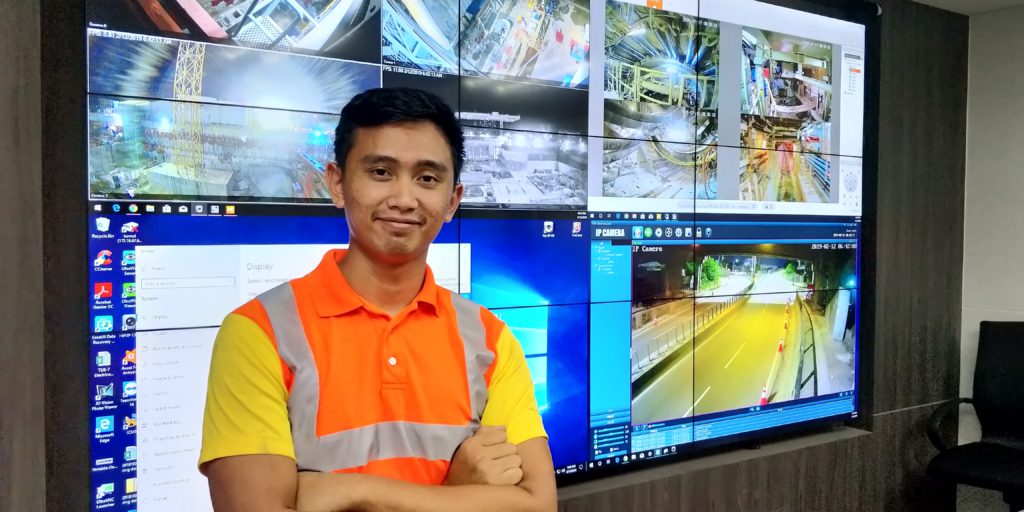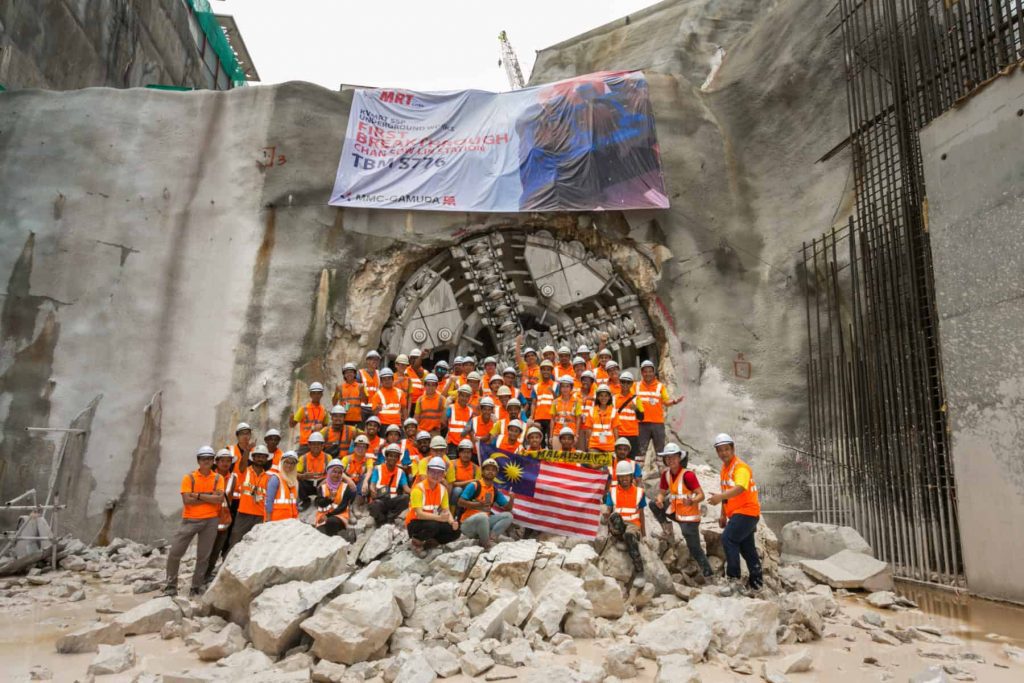It was a momentous occasion for more than 100 guests, members of the media and MRT project team as they gathered at the Chan Sow Lin MRT station in Kuala Lumpur to witness the Tunnel Boring Machine (TBM) breakthrough for the MRT SSP Line.
This marks a milestone for MMC-Gamuda’s tunnelling team after the Variable Density TBM (VDTBM) started its 1.9-kilometre journey on March 1, 2018 at the Bandar Malaysia (North) MRT station. The tunnel drive is the first of 16 needed to complete the 13.5km underground section for the MRT SSP Line.
Generation of tunnellers
Ng Hau Wei MMC-Gamuda Deputy Project Director, who has been involved in tunnelling work since the days of the construction of the Stormwater Management And Road Tunnel (SMART Tunnel), said the geology encountered during this tunnel drive is similar to what he saw while working on the SMART tunnel.
“But with our highly skilled and experienced tunnel crew, we are able to mitigate the challenges. We have also managed to retain a majority of our team from MRT SBK Line. They have invaluable experience, with 18 years of tunnelling under their belt – from SMART to MRT SSP Line,” he said.
Being part of the crew, 26-year-old Faris Mohd Yusof MMC-Gamuda Tunnel Engineer shared that the tunnel crew are a close-knit group, who are very hardworking.

“While my background is in mechanical engineering, I attended five programmes at the Tunnelling Training Academy (TTA) to familiarise myself with the fundamentals of tunnelling. This is important for me to carry out my work as we need to accurately communicate technical instructions.
“My daily work consists of going through shift reports, check and monitor TBM parameters, help prepare bridge management plans and even giving public tours of our facility at Bandar Malaysia (North).”
Faris was also involved in managing the launching facility at Bandar Malaysia (North) for the TBM to start its tunnel drive.
“I’m very proud to be a part of this TBM breakthrough as it signifies the successful completion of the first tunnel section for the underground alignment.”
Since working at MMC-Gamuda, Faris has honed his technical knowledge, management and communication skills as well as managing resources.
He hopes to one day to inspire the company to embark on an infrastructure project that benefits all Malaysians.
Overcoming challenges
Dato’ Ubull Din Om MMC-Gamuda Construction Director said the completion of the tunnel drive is cause for celebration as it was more difficult than the tunnelling work for the MRT SBK Line.
“The geological profile of this area is of the Extreme V karstic limestone type, where ground conditions are unpredictable. We had to tunnel some 20 metres beneath the 13-lane Jalan Sungai Besi, the busy Jalan Chan Sow Lin and live railway tracks near the Chan Sow Lin LRT station.”
Ubull added that the team carried out significant work to prevent disruption to traffic and human activity above ground.
The experienced tunnellers also did extensive investigation to understand the geological conditions surrounding the tunnel drive. Instruments were installed to gauge and prevent sinkhole occurrences.
Our objective has always been about upskilling local workforce for nation-building.
“Our team is among the very few tunnellers in the world capable of tackling limestone-type ground conditions that we ourselves have developed the solution for in the form of the VDTBM,” said Ubull.
“These were all done by our experienced and well-trained tunnel crew. It is a testament to the investment in our TTA as well as our TBM technology too. With systematic grooming via our TTA, we have equipped our graduates with the right skills and ready to take on other tunnelling works within Malaysia and also internationally.
Tunnelling Training Academy
The TTA was established in 2011 to meet the need for tunnelling skills and expertise for the MRT project. Dubbed the world’s first, it is designed to especially produce skilled manpower for the tunnelling industry.
It is an initiative to upgrade knowledge, skills, and performance of workers in the local construction industry, providing an adequate supply of specialists, technicians, and skilled labour to support the rollout of the MRT and other projects requiring tunnelling expertise.
So far, the academy has trained more than 500 people.

